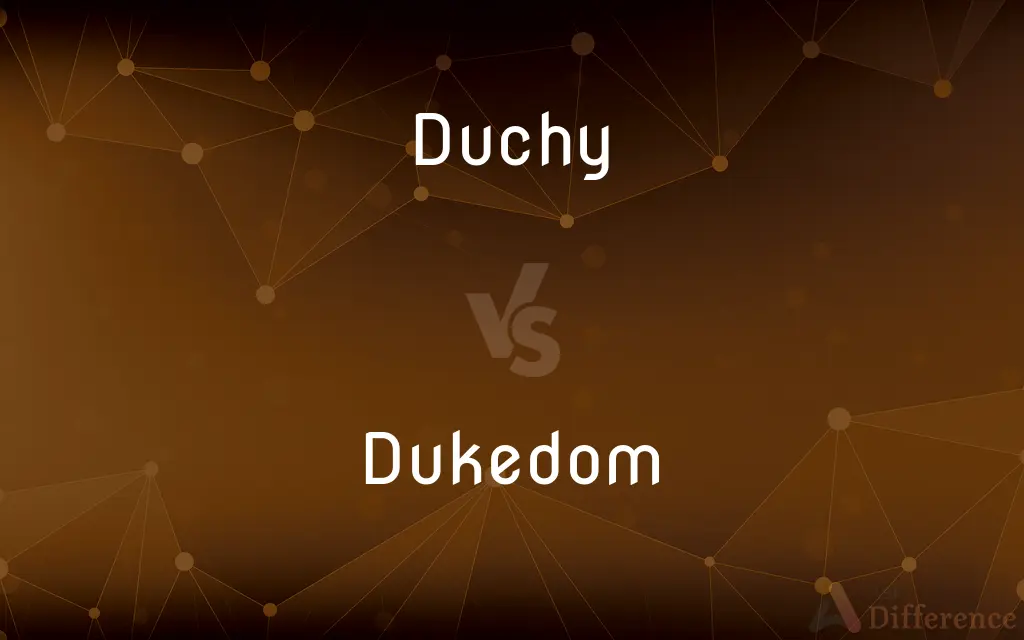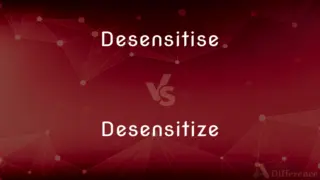Duchy vs. Dukedom — What's the Difference?
By Maham Liaqat & Urooj Arif — Updated on April 4, 2024
A duchy is a territory or realm ruled by a duke or duchess, while a dukedom refers to the title or rank of a duke.

Difference Between Duchy and Dukedom
Table of Contents
ADVERTISEMENT
Key Differences
Duchy and dukedom are terms associated with nobility, specifically within the context of ranks and territories governed by dukes. A duchy represents the actual land, domain, or territory over which a duke or duchess exercises authority and jurisdiction. It encompasses the physical areas, including towns, villages, and countryside, under the duke's control. On the other hand, a dukedom refers to the title or status conferred upon an individual, making them a duke or duchess. This title often comes with certain privileges, responsibilities, and sometimes, the governance of a duchy.
While a duchy is concerned with geographic and administrative aspects, a dukedom focuses on the rank within the nobility hierarchy. For example, when someone is granted a dukedom, they receive the noble title of duke, but they may not necessarily be granted control over a duchy. Conversely, the term duchy always implies a geographical entity.
The distinction between these terms also reflects their usage in different contexts. Historical documents, legal texts, and discussions about territorial governance and rights are more likely to refer to duchies. In contrast, discussions about the nobility, titles, and lineage are more likely to use the term dukedom.
Historically, the creation and governance of duchies were significant for controlling territories and asserting power, especially in feudal systems. Dukedoms, as titles, were and are still used to signify rank and privilege within the social hierarchy, often granted by the monarch as a reward for loyalty or service.
In modern contexts, the practical importance of duchies has diminished in many countries, with their roles largely ceremonial or historical. However, dukedoms remain significant within the frameworks of nobility and royalty, signifying a person's status, heritage, and sometimes, ceremonial duties or roles within the state.
ADVERTISEMENT
Comparison Chart
Definition
A territory or domain ruled by a duke or duchess.
The title or rank of a duke.
Focus
Geographic and administrative.
Nobility hierarchy and title.
Implication
Always refers to a physical area or realm.
Refers to the status or rank, not necessarily a territory.
Usage Context
Territorial governance, historical documents.
Nobility, titles, lineage, ceremonial roles.
Significance
Historically significant for control and governance.
Signifies rank, privilege, and sometimes, responsibilities.
Compare with Definitions
Duchy
A territorial domain governed by a duke or duchess.
The duchy encompassed several prosperous towns and villages.
Dukedom
Can be purely ceremonial or symbolic in modern times.
Today, the dukedom carries more historical significance than political power.
Duchy
Represents physical control over an area.
The duchy's borders expanded after the treaty.
Dukedom
Not necessarily tied to a geographic territory.
His dukedom did not come with control over a duchy.
Duchy
Concerns the land and its administration.
The duchy's wealth was evident in its well-maintained roads and public buildings.
Dukedom
Associated with lineage and inheritance.
The dukedom has been in their family for generations.
Duchy
Historically, a significant unit of territorial organization.
The duchy played a crucial role in the region's defense strategy.
Dukedom
The title or rank conferred upon an individual, making them a duke.
He was granted a dukedom for his services to the crown.
Duchy
Used in discussions about governance and rights.
The laws of the duchy were known for their fairness.
Dukedom
Focuses on nobility and social hierarchy.
The dukedom placed him just below the rank of prince.
Duchy
A duchy, also called a dukedom, is a medieval country, territory, fief, or domain ruled by a duke or duchess, a high-ranking nobleman hierarchically second to the king or queen in European tradition. The term is used almost exclusively in Europe.
Dukedom
A duchy.
Duchy
The territory ruled by a duke or duchess; a dukedom.
Dukedom
The office, rank, or title of a duke.
Duchy
A dominion or region ruled by a duke or duchess.
Dukedom
A region ruled by a duke or duchess; a duchy.
Duchy
The territory or dominions of a duke; a dukedom.
Dukedom
The rank or title of a duke.
Duchy
The domain controlled by a duke or duchess
Dukedom
The territory of a duke.
Dukedom
The title or dignity of a duke.
Dukedom
The dignity or rank or position of a duke
Dukedom
The domain controlled by a duke or duchess
Common Curiosities
Are duchies still politically relevant today?
In most countries, duchies have lost their political power and are either historical or ceremonial, but the title of duke or duchess may still carry social prestige.
How does one become a duke or duchess?
Becoming a duke or duchess typically involves royal appointment or inheritance of the title, often associated with historical services or lineage.
What does dukedom mean?
Dukedom refers to the rank or title of a duke, indicating nobility status.
How is a duchy different from a county?
A duchy is larger and ranked higher in the nobility hierarchy than a county, which is another type of territorial division usually governed by a count or earl.
Do dukes and duchesses have any power in modern governments?
In most cases, no. Their roles are predominantly ceremonial, with historical titles not conveying political power.
What is a duchy?
A duchy is the territory or land governed by a duke or duchess.
Can dukedoms be created or abolished?
Yes, monarchies can create or abolish dukedoms, adjusting the nobility hierarchy as deemed appropriate.
Can a duke have a dukedom without a duchy?
Yes, a duke can have the title (dukedom) without necessarily governing a physical territory (duchy).
Is the title of duke or duchess always hereditary?
While often hereditary, dukedoms can also be granted by the monarch as a lifetime title, which does not pass to descendants unless specifically designated.
Can a woman hold a dukedom?
Yes, a woman can hold a dukedom, either in her own right or through marriage, and is typically referred to as a duchess.
What happens to a duchy when there is no heir?
If there is no heir, the duchy may revert to the crown or the sovereign to be re-assigned or absorbed into other territories.
How are duchies and dukedoms viewed in societies without a monarchy?
In societies without a monarchy, duchies and dukedoms may not exist as formal titles or roles and are often of interest only in historical or cultural contexts.
What are the responsibilities of a duke or duchess?
Historically, they had significant administrative and military responsibilities over their duchies. Today, their roles are largely ceremonial or symbolic.
What is the significance of a duchy in historical contexts?
Duchies were crucial for the administration and defense of territories, serving as important political and military units in feudal systems.
What role do duchies and dukedoms play in cultural or national identity?
They can be significant for cultural heritage and national identity, symbolizing historical periods, regional histories, and traditional social structures.
Share Your Discovery

Previous Comparison
Desensitise vs. Desensitize
Next Comparison
Ip vs. RipAuthor Spotlight
Written by
Maham LiaqatCo-written by
Urooj ArifUrooj is a skilled content writer at Ask Difference, known for her exceptional ability to simplify complex topics into engaging and informative content. With a passion for research and a flair for clear, concise writing, she consistently delivers articles that resonate with our diverse audience.















































